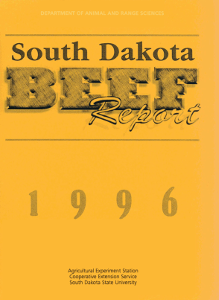Document Type
Report
Report Number
96-6
Publication Date
1996
Keywords
mga, puberty, heifers
Summary
A 2-year study (1 995 and 1996) utilized prepubertal beef heifers to study the effects of feeding MGA to induce puberty. Heifers were allotted to two groups, control or treatment, based on breed, age and weight. Treatment heifers received MGA for 14 days at a rate of .4 mglday with their diet, while control heifers received the same diet free of MGA. In year 1 (n = 55; control = 28, treatment = 27), heifers averaged 627.7 Ib and were 301.9 days of age at the start of the treatment. There was no difference in age at puberty (P=.65) with control heifers 378.5 rt8.3 days of age and treatment heifers 373.0rt8.5 days of age. Forty-seven of 55 heifers became pregnant during the breeding season (85.5%). Of the 47 heifers, 37 heifers gave birth to a live calf (78.7%). In year 2 (control =20, treatment = 21 ), heifers averaged 609.0 Ib and were 300.4 days of age at the start of the treatment. Control heifers were 373.6 ± 7.3 days of age and treatment heifers 382.4rt7.3 days of age at puberty (P= .40). Thirty-eight of 41 heifers became pregnant during the breeding season (92.7%). Thirty-five of 41 heifers were bred Al (85.4%). Thirteen of 16 control heifers and 12 of 19 treatment heifers became pregnant to Al (P>.50). The use of MGA to induce puberty has potential, but further research is needed to determine the age at which it should be administered.
Number of Pages
5
Format
application/pdf
Language
en
Publisher
South Dakota State University
Rights
Copyright © 1996 South Dakota State University.
Recommended Citation
Butler, L. M.; Miller, H. L.; Zalesky, D. D.; Marshall, D. M.; VanderWal, K.; and Moret, C., "Effects of MGA on Prepubertal Beef Heifers" (1996). South Dakota Beef Report, 1996. 7.
https://openprairie.sdstate.edu/sd_beefreport_1996/7

